- Home
- Alison McGhee
Pablo and Birdy
Pablo and Birdy Read online
For all those who build new lives in distant lands
-A. M.
ONE
READY, BIRDY?” PABLO said, and he held out his finger for her. “Up you go.”
Up she jumped. Out the door, careful not to wake Emmanuel, who was asleep behind the closed door of his bedroom, and down the four flights of stairs they went. It was spring, and the town of Isla was quiet at dawn, with the sun just beginning to glimmer on the ocean a few blocks away. But the chickens and pigeons and parrots were already up and about, scratching and clucking around the empty sidewalks.
Soon the shops and cafés would open for business. Soon Pablo and Emmanuel would unlock Seafaring Souvenirs for the day. Pablo would prop open the double doors and wheel the T-shirt racks into the sunshine. Soon the old double-decker red bus would lumber its way down the street, tourists with their sun hats leaning out from the open windows.
But not yet.
Pablo’s bike leaned against the side of their apartment building, hidden behind the bougainvillea. Birdy clung to his forearm, her talons gripping his skin, as he wheeled it out. She jumped into the basket that Pablo had bolted to the handlebars, Pablo swung his leg over the frame, and they were off.
Past Pierre’s Goodies and Lula Tattoo, past the Parrot Café and Maria’s Critter Clinic they went. They took a right at the end of the block, cruised past the Parrot Rescue Sanctuary, through the palm trees, and onto the boardwalk. Pablo leaned the bike against the railing by the wooden stairs that led to the beach and crooked his forearm again for Birdy.
“Up you go.”
Once they were down by the water, she fluttered to the top of his head and dug in with her talons.
“Careful now, Birdy-bird,” he said. “That’s my brain up there, you know.”
Birdy swatted him on the ear with her wing. Pablo held his pointer finger straight up in the air and Birdy nipped it gently with her beak. There were many parrots who would take advantage of an unguarded finger, but not Birdy. Not when it came to Pablo, anyway.
“Hold on tight now,” he said, and he hopped down onto the sand.
Birdy held on tight. The shoreline was smoothed by the high tide, unmarred by footsteps or paw prints. No one but Pablo and Birdy was out. A lone orange shovel poked up, half-covered with sand, next to a dune. Later today the beach would be busy and noisy with little kids, boogie boarders, fishermen nosing their boats into the marina at the far edge of the harbor, and the coconut man and the pepitas woman trudging barefoot down the beach, hawking their wares. But right now, the beach was all theirs.
“Want to fly?” Pablo asked. Birdy jumped down to his shoulder and ducked her head into his neck. That meant yes.
“Hold on tight then,” he said, and she dug her talons into his shoulder. He put one hand over them for extra measure. “Uno, dos, tres . . .” and down the beach they went. Birdy held on tight, Pablo gradually increased his speed from a jog to a sprint, and then, in a whoosh, Birdy spread her wings as wide as they could go. The breeze blew Pablo’s hair back, and for a moment he felt as if his feet might leave the ground. Was this what flying felt like? Even a little bit? He wished he knew. But Pablo was a boy, not a bird, so he could only guess.
One thing he knew for sure was that this was as close as Birdy ever came to actual flying, and she loved it. She swayed on his shoulder, her talons clinging tight and her head lifted to the breeze. Almost-flying was Pablo and Birdy’s morning ritual. Some people walked their dogs, but Pablo? He flew his bird down the beach. Pablo ran and ran and ran, until he had to stop and catch his breath. They were at the far end of the beach now, no one else around. Only gulls, with their perpetual hunger, wheeled and cried above them, scanning the beach for something to eat. Pablo shaded his eyes and watched them. Birdy’s talons clenched and released on his shoulder. Did she wish that she, too, could soar into the sky? It must be hard to be a bird who couldn’t fly.
“Birdy?” Pablo spoke softly, so that even if someone had been nearby, only Birdy would hear him. He slid his feet forward so that he was standing right at the shoreline. “Do you remember way back all those years ago? When it was just you and me?”
She dug her talons in a bit, her way of letting him know that she was listening.
“Because I don’t,” he said.
She shifted her weight from side to side. His fingers found and closed over the necklace he never took off, his Dios me bendiga necklace. The stone pendant, with a tiny hole drilled through it, was strung on a narrow leather band. Pablo kept it hidden beneath his T-shirt. Looking out at the water, it was hard to believe that they were at the edge of an ocean. The waves were tiny right now, sloshing in and out like water in a baby’s bathtub, and they tickled his toes.
“Do you remember the big storm that Emmanuel says came through the day before we got here?”
This was the same question he asked her every year. And every year, she was silent. She dug her talons in a little harder. Still listening.
“It’s that time of year,” Pablo said. “They’re going to start in again.”
Birdy’s talons tightened again. She was the only one he talked to about things like this, and she always let him know she was listening.
“ ‘Double digits!’ ” Pablo said in a fake grown-up voice. “ ‘What are you going to do for your birthday?’ ”
Behind them came the soft plop of a coconut, dropping from a palm tree onto the sand. The water wasn’t always calm like this. The ocean had a mind of its own. If it were high tide instead of low, the way it was now, Pablo would be standing underwater. And if the winds whipped up the way they sometimes did, the fronds of the palm trees would be blowing in a single direction. Huge waves were known to roar right over the beach and up the stairs and the boardwalk. When a storm was on the way, the inhabitants of Isla got ready. Pierre nailed boards over the big picture window of his bakery. Lula closed and latched the shutters on Lula Tattoo. Maria gathered up all the animals staying at the clinic and took them to her house, sheltered by the pine forest at the other end of town. Emmanuel and Pablo wheeled in the T-shirt racks, rolled up the awnings, buttressed the double doors with sandbags, and locked up tight.
But today there was no storm and no hint of one on the horizon. The breeze that blew today was soft.
“It’s not even my real birthday,” Pablo muttered. “They should call it my who-knows-what-his-real-birthday-is day. My non-birthday.”
The day after a major storm could bring all manner of flotsam floating in on the waves: pieces of driftwood, the smashed hull of a fishing boat, buoys, bottles, skeletons of enormous fish. Once, even though it was hard to believe, a baby had come floating in to shore.
Pablo had been that baby.
TWO
EVERYONE WHO LIVED in Isla knew the story of Birdy and Pablo. After all, Isla was a tiny town, and all the townspeople had been there the day, more than nine years ago now, that the little inflatable swimming pool came floating in on the tide. They had woken to the sound of Emmanuel shouting from the shore. It was dawn and he had been down there on the beach as usual, the way he always was the day after a big storm, waiting for whatever the waves might bring: sea glass or unusual shells or driftwood or some other kind of treasure. Things that he could sell in his souvenir store.
Sometimes he brought a sack to hold the things he collected, but not on that particular day. On that day, Emmanuel’s hands were empty.
“At first I thought it was a huge fish,” he would say when recounting the story. “A shark or a dolphin, or maybe even a whale.”
Emmanuel had stood barefoot at the waterline, his pants rolled up against the waves, and watched the strange object float in. Closer and closer it came, gradually taking shape.
“It happened durin
g the winds of change, if you remember, the morning after that wild storm”—and everyone did remember, because that storm had been particularly wild—“and strange things wash up after wild storms.”
Emmanuel had stood still, watching and waiting. It wasn’t a fish. Nor was it a boat, or a piece of driftwood, or a tangled mess of seaweed.
“I was prepared for anything,” he said.
Anything, that is, except a baby.
When he was sure what his eyes were telling him, he ran straight into the waves.
“Baby!” he shouted. “It’s a baby! In a swimming pool! And, and . . . a bird!”
At first no one heard his shouts. The previous night had been filled with furious winds and restless dreams, and most of the townspeople were still asleep. In the first light of the sun, alone, Emmanuel gathered the inflatable pool into his arms. So focused was he on the baby, sound asleep, held securely beneath a latticework of knotted twine, that he barely paid attention to the bird who stood guard, her talons gripped tightly on the twine. In fact, he tried to shoo her off.
But she wasn’t about to let go.
Her talons were latched in a death grip on the twine that bound the baby into the swimming pool. In the hurried moment that Emmanuel looked at the bird, tearing his attention away from the sleeping dark-haired baby, he registered her as worn out, with dull eyes and limp, dirty feathers. Scrawny. Severely stressed. But there was something beautiful about her nonetheless.
“I could see it even in that first moment,” he would tell his friends later. “She was special. There was a . . . a magnificence about her.”
Emmanuel was right. It wasn’t until weeks later, when the bird refused to leave the baby’s side, that everyone else saw how unusual she was. No one had seen a parrot with her coloring before. Lavender, with under-feathers of iridescent blue-green. She anticipated the baby’s needs, bringing him bits of chopped up mango or banana when he was hungry. Pulling his little green blanket up over his chest when he fell asleep.
“She must have been with Pablo from the beginning,” Emmanuel said. “She was like a bird mother, watching over him. It was only when she was sure that I meant him no harm that she let go of the twine.”
Emmanuel had carried the baby, still sleeping, still secured in the inflatable pool, back to his souvenir store at the end of the block. The bird jumped to his shoulder and dug her talons in tight. Every now and then she leaned forward and nipped Emmanuel’s ear, as if to show him who was boss.
“I tried talking to her,” Emmanuel said. “She’s a parrot, after all. But she didn’t want to listen. She was the one in charge. Not me.”
At this point in the story, he raised his arms like wings and fixed his listeners with a fierce stare, imitating the way Birdy had stood guard in front of baby Pablo.
“I told her not to worry, that the baby was safe now. And eventually she believed me, but it took weeks.”
Early risers who were just opening their windows or doors to let in the morning breeze had stopped in amazement at the sight of their friend Emmanuel and his bundle.
“It’s a baby,” Emmanuel kept saying, as if somehow that would explain everything.
By the time he got to the store, the bird was drooping with exhaustion. Lula was sweeping the sidewalk in front of her henna tattoo shop. Pierre had just propped open the door to Pierre’s Goodies.
“You should have seen the looks on your faces,” Emmanuel always said when recounting the story. “I thought nothing could make either of you speechless, but you were speechless that day.”
“You can’t deny it was a wondrous sight,” Pierre always said at this point. “There you were, Pablo”—he would nod at Pablo as if his arrival had happened just recently—“wrapped and knotted into that little swimming pool with so much twine that it’s a wonder you could breathe. Mon dieu! But you just slept on.”
Lula would look at Birdy and shake her head, as if she still couldn’t believe that Birdy existed. “And there you were, Birdy, holding on to Pablo for dear life.”
“For dear life,” Pierre would echo, and Emmanuel would nod.
Birdy, silent as always, closed her eyes and cocked her head whenever she heard those words, for dear life, as if they reminded her of something. But what that something was, no one knew.
THREE
PABLO WASN’T A baby anymore. He was turning ten in a couple of weeks, at least according to Emmanuel, who had decided to celebrate Pablo’s birthday every year on the anniversary of the day he had floated in on the waves. Every year at this time he had a hard time sleeping. He didn’t remember anything about his arrival in Isla. It was a mystery. Where had he come from? How had he ended up out on the ocean alone, with only Birdy to watch over him? These questions were always with him, but he only let himself think—really think—about them once a year. And now was the once.
“I wish you could give me a clue,” he said. “Anything.”
The beach in early morning was where they came when Pablo needed to talk about things he couldn’t tell anyone but Birdy. They were still the only ones here, but that wouldn’t last long. Already Pablo could hear the faint purr of a fishing boat motor in the direction of the marina.
“All the other birds talk,” he reminded Birdy.
First Emmanuel, and then Pablo, when he grew older, had tried to get Birdy to talk. She was a parrot, after all, and most parrots could be taught to speak. Birdy’s origins were a mystery, but maybe, if she remembered and could speak even a few words or phrases, they could figure out something of her past. Emmanuel had tried to teach her a few words—Mi nombre es Birdy, for example—but she remained silent. Sometimes even now, when they were alone on the beach, Pablo would coax her to say something. Nothing silly like Polly want a cracker? which was a tourist thing to say, but Let’s fly, Pablo, or its Spanish equivalent, Vamos a volar, Pablo. But even when he tempted her with treats, especially diced pineapple, she never made a sound except when she was deeply asleep. And that was more like a mutter, or a sigh, instead of actual words.
“Yes, they all talk,” he said again, “even if they don’t have a lot to say.”
“Hey!” came a nearby squawk. “Watch what you’re saying!”
Oh no. The Committee was already up and after them. Pablo turned, Birdy still on his shoulder, in the direction of the squawk. There was Peaches, the squawker, fluttering across the boardwalk. Mr. Chuckles was right behind her, followed by Sugar Baby and Rhody. Peaches was an African gray, Mr. Chuckles was a budgie, and Sugar Baby was a monk parakeet.
Rhody was not a parrot at all—he was a Rhode Island Red rooster—but he seemed to think he was. He disdained the other Isla chickens, who clucked and strutted their way along the sidewalks and in the cafés, in favor of hanging out with the parrots.
These four birds roamed the town together like a roving band of greeters, which was why Pablo had nicknamed them the Committee. Down the boardwalk and across the sand they came, hopping and fluttering and clucking. Birdy dug her talons into Pablo and hung on tight. She held herself a little apart from the others, as always. Silent, as always.
“What day is it?” said Sugar Baby.
“A day of questions that I don’t know the answers to,” Pablo said. “That’s what day it is. Which is why I came down here to talk to Birdy alone, without you all eavesdropping.”
“Hey! Watch what you’re saying!” squawked Peaches.
“You watch what you’re saying, Peaches.”
“HAHAHAHAHA!” This from Mr. Chuckles, who enjoyed a good laugh even when there was nothing to laugh at. Now he cocked his head at Birdy and fluffed up his feathers. “Nice threads!” he said. “Lookin’ sharp!”
Birdy didn’t even glance at him. This was typical, but Mr. Chuckles had never stopped trying to get a reaction out of her. Sometimes Pablo thought he had a crush on Birdy.
“HAHAHAHAHA!” Mr. Chuckles said now, as if to cover up his embarrassment that Birdy was ignoring him. “HAHAHAHAHA!”
“Enough
now,” said Pablo. “Time to get back.”
He had come here with Birdy for the express purpose of talking to her about his birthday, which Emmanuel and everyone else looked forward to every year but which Pablo dreaded. But it was no use trying to talk now, not with the Committee eavesdropping.
“What day is it?” sighed Sugar Baby again.
Sugar Baby was a quiet little parakeet who wasn’t fond of the beach. She liked to stay in close range of Lula and Lula’s tattoo shop. Each member of the Committee had a special human, one preferred above others. Lula was Sugar Baby’s favorite human in the same way that Mr. Chuckles preferred Pierre, Rhody liked the flower lady, and Peaches was a fan of Emmanuel. And of course, they all loved Maria, the veterinarian. All creatures, whether birds or dogs or cats or ferrets or alpacas, loved Maria.
None of the Committee members was like Birdy, though. No bird in the world was devoted to another human the way Birdy was devoted to Pablo.
FOUR
ISLA WAS FAMOUS for its birds. They strutted in and out of the shops and cafés, roosted in bushes and trees, and raised their young without fear of humans. They were fed and sheltered and photographed and celebrated. Birds were one of the main tourist attractions of the town.
Even when they misbehaved, they were tolerated. Take Mr. Chuckles on Sunday mornings, for example. He was a self-appointed fashion judge, and Sunday was his favorite day of the week. Every Sunday morning he installed himself, along with the Committee, in the lower limb of the box elder tree just outside the church.
“Nice threads!”
“Hmm.”
“HAHAHAHAHA!”
Nice threads! was what everyone wanted to hear. No one wanted a Hmm, but even hmms were preferred over a Mr. Chuckles HAHAHAHAHA. Over time, the churchgoers had gradually stepped up their attire. It was to the point now where women tried to outdo one another with their hats and men with their colorful shirts.
“Mr. Chuckles is a tough judge,” Lula said.

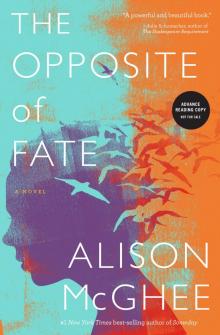 The Opposite of Fate (ARC)
The Opposite of Fate (ARC)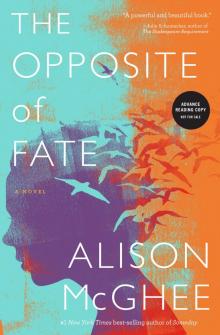 The Opposite of Fate
The Opposite of Fate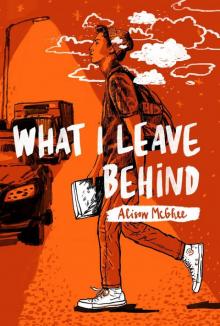 What I Leave Behind
What I Leave Behind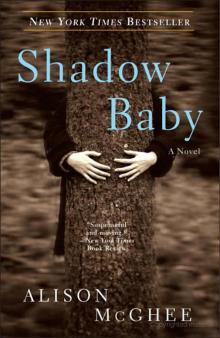 Shadow Baby
Shadow Baby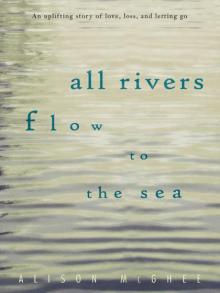 All Rivers Flow to the Sea
All Rivers Flow to the Sea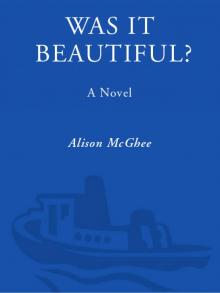 Was It Beautiful?
Was It Beautiful?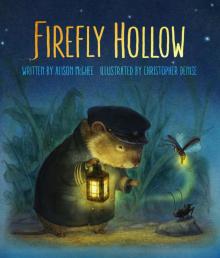 Firefly Hollow
Firefly Hollow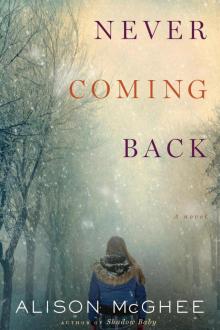 Never Coming Back
Never Coming Back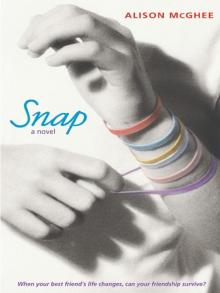 Snap
Snap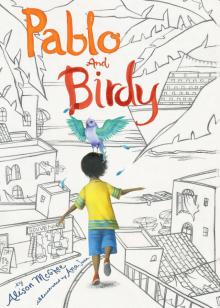 Pablo and Birdy
Pablo and Birdy